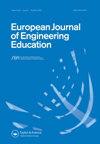Influence of institutional factors on the civil engineering student performance in Brazil
IF 2.8
Q2 EDUCATION & EDUCATIONAL RESEARCH
引用次数: 0
Abstract
ABSTRACT The reasons why Brazilian civil engineering education has not achieved competitive performance worldwide remain unclear. Thus, this study aims to identify what factors influence student performance in civil engineering undergraduate programs in public institutions in Brazil. Multiple linear regression methods were used to analyse the interactions between the student performance (dependent variable) and the professors’ and universities’ attributes (predictors). The analysis shows that the professor’s qualification and didactics are significant attributes, as are the time of the program’s existence, the academic organisation (if it is annual or semester courses), and the institutions’ administrative jurisdiction. The discussion presented possible explanations for each attribute’s contribution. The study adds to the theory of predicting student performance in a developing country scenario, in this case, Latin America, where engineering education has less investments in academic infrastructure and human capital.制度因素对巴西土木工程专业学生成绩的影响
巴西土木工程教育未能在全球范围内取得竞争力的原因尚不清楚。因此,本研究旨在确定哪些因素会影响巴西公共机构土木工程本科生项目的学生表现。多元线性回归方法用于分析学生表现(因变量)与教授和大学属性(预测因素)之间的相互作用。分析表明,教授的资格和教学方法是重要的属性,课程存在的时间、学术组织(如果是年度或学期课程)和机构的行政管辖权也是重要的属性。讨论为每个属性的贡献提供了可能的解释。这项研究补充了预测发展中国家学生表现的理论,在本例中是拉丁美洲,那里的工程教育在学术基础设施和人力资本方面的投资较少。
本文章由计算机程序翻译,如有差异,请以英文原文为准。
求助全文
约1分钟内获得全文
求助全文
来源期刊

European Journal of Engineering Education
EDUCATION & EDUCATIONAL RESEARCH-
CiteScore
7.30
自引率
13.00%
发文量
64
期刊介绍:
European Journal of Engineering Education is published six times a year in print and electronic editions and provides an essential forum for dialogue between researchers and specialists in the field of engineering education, at European and worldwide levels. European Journal of Engineering Education is the Official Journal of SEFI, the Socièté Européenne pour la Formation des Ingénieurs (the European Society for Engineering Education). SEFI is a non-governmental organization whose aims are to develop information about engineering education, to improve communication and exchange between professors, researchers and students and to promote cooperation between the various institutions concerned with engineering education.
 求助内容:
求助内容: 应助结果提醒方式:
应助结果提醒方式:


